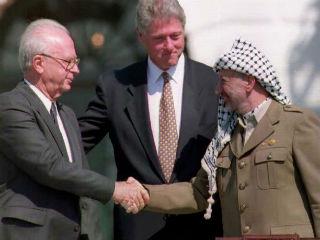by
Uri Dromi*
In front of a large crowd, and watched through television by many millions around the world, two former arch-enemies — Israeli Prime Minister Yitzhak Rabin and Palestinian leader Yaser Arafat — shook hands. A new, unprecedented and promising chapter has opened in the Arab-Israeli relations.
It is difficult today, after so many frustrations, setbacks and bloodshed, to describe the surge of optimism we felt that day. On the stalls behind the crowd, Israeli and Palestinian journalists hugged each other emotionally. We were confident that nothing would be the same.
Indeed, we felt the change right away, and it exceeded the immediate Israeli-Palestinian conflict. For years we have been told by the Arabs that the Palestinian question was the main reason for their enmity towards Israel, and once this issue is settled, Arab countries would make peace with Israel. Now, with the Oslo Accords signed, it was time for the Arabs to stand by their word. They certainly did.
The following day, we took off from Andrews Air Force Base but instead of heading back home, we made a surprise landing in Morocco, considered up to that moment an enemy state, where King Hassan II gave us the warmest and most lavish royal welcome. And this is the same Morocco which in the Yom Kippur War sent an armored contingent to fight against Israel on the Golan Heights.
Greater things, however, awaited us on the Arab front in the wake of that historic handshake. Secret talks with Jordan started right away, and on Oct. 26, 1994, I ushered the journalists again, this time to the Araba Crossing between Israel and Jordan, close to the southern city of Eilat. In front of a huge, jubilant crowd, President Bill Clinton praised King Hussein who had fulfilled the dream of his grandfather, King Abdullah, to make peace with the Israelis.
And to Yitzhak Rabin he said: “As a general, you have won many battles through strength and courage. But now, through strength and courage, you command the army of peace, and you have won the greatest victory of all. We salute you.”
It turned out that the peace accord signed that day was a win-win deal. It was so strong, that an Intifada in 2000, a war in Lebanon in 2006 and three military operations in Gaza between 2008 and 2014 couldn’t shake it. Of course, the Jordanians expressed their anger over the bloodshed between Israel and the other Arabs, but had strong reasons why to stick to the peace treaty: Israel is the most loyal military ally of the Jordanians in the troublesome Middle East, and like the Egyptians, who had spearheaded the peace with Israel, they received generous trade dividends from the United States in return.
Furthermore, the Sunni states of the Middle East joined in the rapprochement with Israel, although not publicly. That they did so more because of their fear of the common enemy, Iran, doesn’t really matter. Seventy years after the concerted Arab attack in 1948 on the nascent State of Israel, with the Secretary General of the Arab League boasting that “the fish of the Mediterranean will eat the bones of the Jews,” the majority of the Arab world accepts Israel as an accomplished fact.
But what about the Palestinians? Wasn’t the ceremony at the White House 25 years ago meant to bring peace between them and the Israelis? It was, but alas, it didn’t work out. Recently, on the 25th anniversary of the Rabin-Arafat handshake, people on both sides indulged in speculations about why the Oslo process had failed. To me it is obvious who the villains are: The extremists on both sides, those who managed to scuttle the peace, the Palestinians with their terrorists and the Israelis with their fanatics, including Yigal Amir, who had assassinated Rabin, the one person who could have pushed the process through.
Having said all that, I still remain an optimist about the prospect of peace between Israelis and Palestinians. Thanks to that handshake, 25 years ago, barriers between Israelis and Arabs fell, resulting either in formal peace or in informal relations and alliances. In this new framework of Arab-Israeli relations, the Palestinians will eventually join the process as well.
*Uri Dromi, former spokesperson of the Yitzhak Rabin and Shimon Peres governments, is the director general of the Jerusalem Press Club.
**Originally published in Miami Herald




 By: N. Peter Kramer
By: N. Peter Kramer
